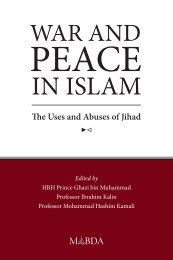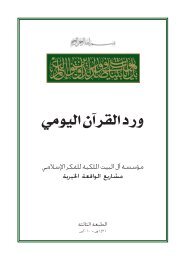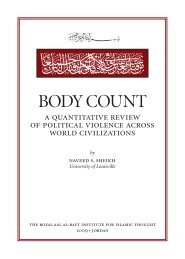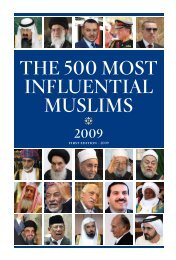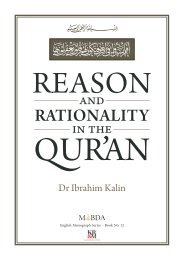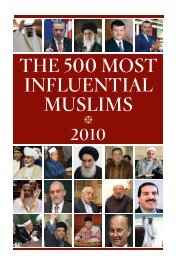You also want an ePaper? Increase the reach of your titles
YUMPU automatically turns print PDFs into web optimized ePapers that Google loves.
their being all these things together; or again: in the spirit, the soul,<br />
the body and the entirety of human beings; or finally: in the soul’s<br />
rectitude; in the effacement of the ego; in the ego’s effacement<br />
from effacement, and the spiritual balance of human beings. Whilst<br />
standing, Muslims recite the opening prayer of the Qur’an the<br />
Fatihah the ‘opening’ and—according to the Prophet Muhammad<br />
himself—“the greatest Surah in the Holy Qur’an”,17 which in<br />
principle contains everything one can and should want to say to<br />
God, and another passage of the Qur’an (open to choice). Before<br />
the prayer, there is a call to prayer (athan) and then a standing call<br />
to prayer (iqama); during each of the movements and during the<br />
bowing, prostrating and sitting-kneeling there are specific blessed<br />
formulas of remembrance, glorification and praise of God; towards<br />
the end of the prayer there are greetings and salutations of peace<br />
to God, to the Prophet and his family, to the believers, to the<br />
righteous and then to all the world; after the prayer there are re<strong>com</strong>mended<br />
prayers and supplications; and of course in addition to<br />
the seventeen obligatory daily rak‘ahs there are a number of other<br />
prayers which it was the Prophet’s sunnah (custom) to pray18 and<br />
17 Sahih Bukhari, Kitab <strong>Tafsir</strong> <strong>Al</strong>-Qur’an, Bab ma Ja’a fi Fatihat <strong>Al</strong>-Kitab (Hadith no. 1);<br />
also: Sahih Bukhari, Kitab Fada’il <strong>Al</strong>-Qur’an , Bab Fadl Fatihat <strong>Al</strong>-Kitab, (Hadith no. 9),<br />
no. 5006.<br />
18 These include: two rak‘ahs before the fajr prayer, two at sunrise (shuruq); two after the<br />
end of the time of the fajr (duha); two before and after the duhr prayers; two after maghrib;<br />
two after ‘isha, and three the shafi’ and witr prayers before sleeping (making a total of about<br />
32 rak‘ahs per day, albeit that there are slight variations amongst scholars as to their details).<br />
There are also specific occasions when extra prayers are demanded (such as the Hajj, the<br />
‘Eid, funerals, marriage, eclipses, entering a mosque, droughts, rain, travelling and so on,<br />
in addition to extra tarawih prayers (eight or twenty cycles — scholars differ on this point)<br />
that it is customary to pray in the blessed month of Ramadan at night, in addition to the<br />
option of waking up in the last part of the night to pray tahajjud prayers, in imitation of the<br />
Qur’anic injunction to the Prophet Muhammad :<br />
And part of the night, keep vigil as a free devotion (nafilatan) from you; perchance<br />
your Lord shall resurrect you in a glorious station. (<strong>Al</strong>-Isra’, 17:79; see also Surat<br />
<strong>Al</strong>-Muzammil, 73:2 and 73:20.)<br />
Other additional and voluntary prayers include: the awabin prayers after the sunset prayer;<br />
the once-off or occasional salat al-tasabih (glorification prayer); prayers after repentance<br />
(tawbah); prayers asking for guidance or a vision (istikharah), and prayers after the ablutions<br />
23



